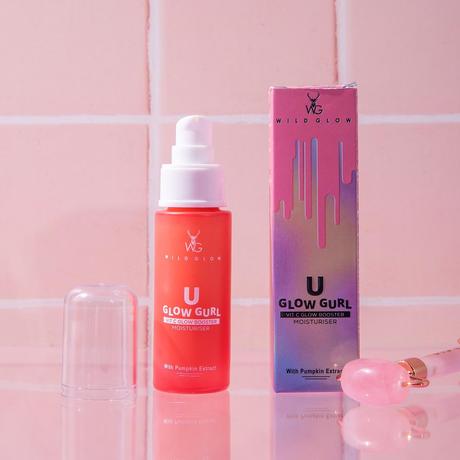Is it okay to use Vitamin C after applying Moisturizer?

Discover the extraordinary world of Vitamin C Moisturiser by WildGlow, where its remarkable health benefits have captivated the masses. Discover the amazing effectiveness of vitamin C - the ultimate immune system enhancer that has safeguarded sailors against scurvy on treacherous voyages and aided in the battle against pesky colds and flu. Chances are, you've experienced the invigorating effects of this essential nutrient firsthand, taking it orally to fortify your body's defenses.
Discover the hidden power of vitamin C - not just for your health, but for your skin too! Unveil the secret weapon that fights against the harmful environmental effects of the sun and air pollution, while actively rejuvenating your skin through collagen synthesis. Embrace the radiant glow and ultimate protection that vitamin C brings, keeping you looking effortlessly fresh and safeguarded.
But how does it actually work? How do you know when to put vitamin C on your skin so it doesn't irritate? Discover the essence of vitamin C as we delve into the answers to your burning questions.
What is Vitamin C?
Vitamin C also known as ascorbic acid is one of the powerful antioxidants that protects skin against free radicals that causes premature aging and skin damage. Vitamin C also helps in college production giving a more firm and youthful complexion.
It also combats harmful toxins, also known as free radicals, that come into contact with your skin from outside sources, such as air pollution, or from within your body, as a result of normal processes, such as your metabolism, making it essential for maintaining healthy skin. Vitamin C is found in Lemon, oranges, papaya, kiwi, pumpkin, and many more.
The human body does not produce vitamin C on its own, meaning we have to consume it through food, drinks, supplements, or skincare products such as Vitamin C serum or moisturizer.
How does vitamin C help the skin?
- Free radicals are unstable molecules that cause dull skin, early aging, and wrinkles. Vitamin C, an antioxidant helps reduce oxidative stress while protecting skin damaged by free radicals.
- Vitamin C promotes collagen synthesis which maintains skin texture and elasticity. As we age, our bodies naturally make less collagen, which causes sagging and fine lines. Vitamin C keeps you looking younger and fuller by helping your body make more collagen.
- Vitamin protects the skin from the harmful rays of the sun, UV rays, and UV light. Though it cannot work as sunscreen it neutralizes free radicals generated by UV rays. It enhances the effectiveness of sunscreen and reduces the skin damage caused by the sun.
- Vitamin C also has brightening properties that help fade dark spots, hyperpigmentation, and acne scars. It increases melanin production, the pigment responsible for skin discoloration.
Should you use Vitamin C after applying moisturizer?
Dermatologists claim that Vitamin C should be always applied before moisturizer or sunscreen. The steps are as follows:
- Cleanse your face thoroughly to remove free radicals or any residue of makeup.
- Apply Vitamin C to your face and neck and area, gently massage in
- Now apply your favorite moisturizer or sunscreen.
What ingredients you should avoid while using Vitamin C?
Vitamin C should never be used with some of the acids and they are:
- AHA (Alpha-hydroxy acid)
- BHA (Beta-hydroxy acid)
- Benzoyl peroxide
How to use Vitamin C serum and Moisturiser?
Vitamin C serum works well on its own, but you can round out your skincare routine with moisturizers like WildGlow VIT C Glow Booster Moisturiser.
Vitamin C serum is best used in the morning to protect your skin from the sun and other environmental irritants during the day. Vitamin C moisturizer is a restorative skincare treatment that promotes skin cell turnover and, when used topically, penetrates the skin deeper than other treatments, making it a great addition to your evening skincare routine.
If you have sensitive skin, layering these serums can cause itching and redness, so make sure to use them separately and do a patch test first.

Vitamin C moisturizer with Pumpkin Extracts
Pros:
- Gives you supple skin
- Enhances natural radiance & glow
- Anti-aging
- Causes reduction in fine lines and wrinkles
- PETA Registered Vegan and Cruelty-free
- Dermat-tested
- Paraben-free
- Toxin-free
Why should you add vitamin C to your routine for taking care of your skin?
- Vitamin C is an acid that can dissolve in water. It is also called ascorbic acid. It is a strong antioxidant that helps the skin in many ways, such as:
- Fighting free radicals, which cause redness, pimples, and dark spots.
- Evens out the skin tone and makes it look bright. Stops the body from making too much melanin, which stops dark spots and discoloration.
- Vitamin C can also help the body make collagen, which gives the face its firm, plump look.
- Experts say that your daily skincare routine should include Vitamin C. But there are so many items out there that it can be hard to figure out how to use them in your skincare routine.
Conclusion:
Vitamin C is an excellent addition to any skincare routine because they have brightening, antioxidant, and anti-aging properties. You may obtain a more radiant and youthful complexion while preserving your skin from environmental harm by integrating a Vitamin C moisturizer or serum into your daily routine. Remember to use a high-quality product that is appropriate for your skin's needs and to check with a dermatologist if you have any special problems or sensitivities. The best face moisturizer with Vitamin C can help you achieve healthier, more vibrant skin with regular usage. For more enhanced and healthy skin, you can try Hyaluronic acid face wash to make your perfect morning skincare routine.

